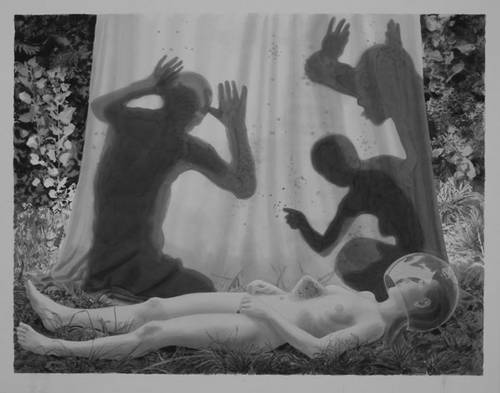Simon Pasieka
14 Jul - 02 Sep 2006
SIMON PASIEKA
"Byby"
In the exhibition „Byby“ we are showing new ink on paper works as well as oil painting of the German artist SIMON PASIEKA.
A naked girl lies on the grass; a mound of sand seems to quasi grow out of her rips, her head encased in a crystall ball. Apparently commited to this voyeuristic situation, she still turns her head faithfully to a white cloth behind which three persons perform shadow dances. A mystical light falls on both sides of the cloth onto the brushes surrounding the scene.
The juveniles, who unite themselves in pictorical landscapes in diverse natural sceneries , seem to secede for a moment from the civilising con-straints structuring their every-day lives. They gather to practice their small ritu-als and trust – so it seems – therewith to find answers to their questions.
References to the men-nature-relationship in romanticism seem apparent; but in Simon Pasiekas works nature remains, in contrast to the romantic conjuration of nature, just a background in a game, whose developing is conducted by the ju-venile protagonists themselves. The objects they use like glass and mirrors do not just remain metaphorical accessoires, but function as tools in that game of fragmentation and recreation of the childish self; a game that – in the course of perception – also adopts unexpected menacing traits.
© Simon Pasieka
Schatten / Shadow
2006
Tusche auf Papier
cm. 121 x 154
"Byby"
In the exhibition „Byby“ we are showing new ink on paper works as well as oil painting of the German artist SIMON PASIEKA.
A naked girl lies on the grass; a mound of sand seems to quasi grow out of her rips, her head encased in a crystall ball. Apparently commited to this voyeuristic situation, she still turns her head faithfully to a white cloth behind which three persons perform shadow dances. A mystical light falls on both sides of the cloth onto the brushes surrounding the scene.
The juveniles, who unite themselves in pictorical landscapes in diverse natural sceneries , seem to secede for a moment from the civilising con-straints structuring their every-day lives. They gather to practice their small ritu-als and trust – so it seems – therewith to find answers to their questions.
References to the men-nature-relationship in romanticism seem apparent; but in Simon Pasiekas works nature remains, in contrast to the romantic conjuration of nature, just a background in a game, whose developing is conducted by the ju-venile protagonists themselves. The objects they use like glass and mirrors do not just remain metaphorical accessoires, but function as tools in that game of fragmentation and recreation of the childish self; a game that – in the course of perception – also adopts unexpected menacing traits.
© Simon Pasieka
Schatten / Shadow
2006
Tusche auf Papier
cm. 121 x 154

